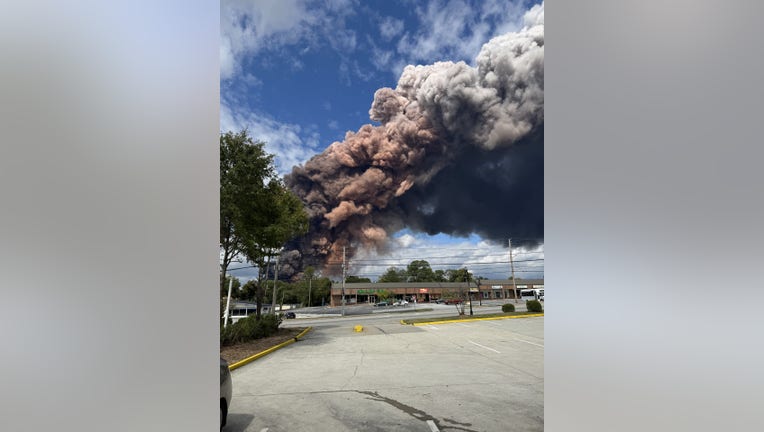BioLab fire: What to know about chlorine, when to contact doctor

Large plumes of smoke billow out of the BioLab in Conyers on September 29, 2024. (Credit: Toney Mosley, Jr.)
ROCKDALE COUNTY, Ga. - Chlorine is a strong chemical that can irritate the lungs and cause serious health issues if inhaled.
Chlorine is a yellow-green gas with a sharp, burning smell. It is commonly used in making chemicals, bleaching, disinfecting water, and cleaning products. Because large amounts of chlorine are produced and transported across the U.S., it’s considered a potential chemical threat due to its toxicity. Chlorine has been involved in both accidental and intentional releases, making it dangerous if inhaled in large amounts. It was even used as a chemical weapon in World War I.
RELATED: BioLab fire: Chlorine in plume, I-20 reopens Monday morning
Accidental chlorine leaks from factories, transport, or homes have happened over the years. Most people exposed to small amounts of chlorine tend to recover fully without long-term health problems.
When chlorine gas is inhaled, it reacts with moisture in the airways, creating acids that irritate and damage the nose, throat, and lungs.
Symptoms of chlorine exposure include:
- Eye irritation: Burning, redness, tearing, blurry vision, and swelling.
- Breathing problems: Sore throat, coughing, and trouble breathing.
- Skin irritation: Burning sensation, redness, swelling, and blisters.
- Other symptoms: Nausea, vomiting
- Lung damage: Fluid buildup in the lungs, known as pulmonary edema.
Chlorine exposure is especially dangerous for people with asthma or other lung conditions. The severity of symptoms depends on how much chlorine a person is exposed to and for how long. Mild symptoms may go away after a few hours, but more severe exposure can last for days.
Children are at higher risk because their lungs and airways are smaller, making them more vulnerable to harmful chemicals.
There is no specific treatment for chlorine poisoning. Care is focused on managing symptoms and helping the person breathe easier. According to the CDC, brief exposure to chlorine usually doesn't cause long-term health problems, but severe exposure could lead to lasting respiratory issues for some people.
What to do if exposed
1. Get away from the source as soon as possible. If it happened indoors, go outside. If it happened outside, go indoors. Leave the area if necessary.
2. If there's a chance that it is on your clothes, take them off immediately. If possible, pull them down your body or cut them off to avoid further skin or soft-tissue exposure.
3. Wash your body as quickly as possible. Soap and warm water is all that is needed. If your eyes are burning or blurry, rinse them with clean, cool, running water for at least 10 minutes. If you wear glasses or contacts, remove them and clean them.
How long does it take for chlorine to affect you?
Chlorine will affect an individual immediately or within a few hours of breathing chlorine gas. The amount of time before symptoms occur depends on the amount of exposure.
When to Call a Doctor
Seek medical attention if you experience:
- Persistent coughing or wheezing
- Trouble breathing, shortness of breath, or chest pain
- Increased pain or discharge from your eyes
- More redness, pain, or pus around skin burns
What a doctor will look for
When a doctor examines a person for chlorine poisoning they are looking for:
- Fast breathing
- Blue skin
- Rapid heartbeat
- Wheezing
- Stomach sinking in under ribs when breathing
- Nasal flaring when breathing
- High-pitched sound when breathing
- Hemorrhage in the respiratory tract
- Runny nose
- Excessive saliva
- Tooth enamel damage
- Signs of chemical burns around nostrils
For More Information
If you have questions, contact your local health department or:
Agency for Toxic Substances and Disease Registry
Division of Toxicology and Human Health Sciences
Phone: 1-800-CDC-INFO
Website: CDC-INFO
You can also call the national toll-free Poison Help Hotline at 1-800-222-1222.

